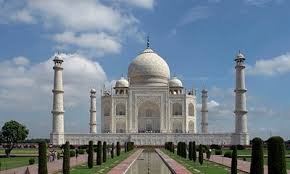THE TAJMAHAL

Taj Mahal: The romantic festival of Shah Jahan
Shah Jahan was a member of the Mughal dynasty, who ruled most of northern India from the beginning of the 16th century to the middle of the 18th century. In 1627, after the death of his father, King Jahangir, Victor Shahjahan bitter rivalry with his brothers emerged, for that, and in 1628. Arjumand Banu Begum himself in the emperor's title in Agra (Mamtaz Mahal, known as one of the well-known "palaces"), whom he He married in 1612, and he cherished three queens as a favorite.
do you know?
Shahjahan finished the work of woodwork after finishing his famous Tower Mahal architect and his workers, so that they would make sure that they would never create any kind of construction.
In 1631, Mumtaz Mahal died after the couple's 14th child was born. Shraddha Shahjahan, known for introducing a number of fascinating structures throughout his reign, ordered the building of the tomb crossing the Yamuna from a palace to his magnificent palace. The construction started in 1632 and will continue for the next two decades. The main architect was probably an Indian nobleman, Ahmed Lahauri, who later designed the red fort in Delhi. Above all, more than 20,000 workers of India, Persia, Europe and Ottoman Empire brought about 1,000 elephants to build a tomb.
Design and construction of Tejam Mahal
Named in honor of the Taj Mahal Mumtaz Mahal, a gem of half a mausoleum is built of white marmalade with a technique called pietra hard forming complex design (including z, crystal, sapphire, sapphire turquoise). Its central dome reached 240 feet (73 meters) high and surrounded by four small domes; Four towers, or minarets, are standing in the corner. According to the Islamic tradition, the verse on the archway to the tomb was inscribed verses from the Qur'an, in addition to numerous other sections of complex. Inside the mausoleum, Mamtaaj Mahal organized by an octagonal marble chamber sculpture and decorated monument with a half-mound, or untied grave. Below the actual thorny garden stage containing its real residue,
Taj Mahal complex left red sandstone divided by a main gateway and square garden by the water dragon pool, as well as a red sandstone mosque and a uniform building. Gii directly from a jawab (or "mirror") to make a complex change in the future of the traditional Mughal building building mosque Will not allow. When the story goes, Shahjahan planned to construct the second ocean from the Taj Mahal across the river, where his death would be buried after his death; Hi Siew Hwin đã được Lynn Kant Bt Amt Bridges, in fact, Aurangzeb (the third son of Shahjahan of Mumtaz Mahal) resigned his father in 1658 and took power. Shahjahan lived in a monastery under house arrest of the Red Fort in Agra, with a view of the mausoleum resting place he was building for his wife; When he died in 1666, he was buried beside him.
Taj Mahal has been there for years
Under the long rule of Aurangzeb (1658-1707), the Mughal empire reached its strength. Tùy nhiên caused his fierce Muslim policy, many Hindu GOM temples and kuthi destruction, reducing the power of enduring empire and killing his mid-18th century by centuries. Even after the demise of Mughal power, after the death of Shahjahan, the Taj Mahal was caught in neglect and lack of trust in the two centuries. In the turn of the 19th century Lord Curzon, the British Viceroy of the Indian Athens, gave a major re-execution of the complex to the tomb as part of a colonial effort to preserve India's artistic and cultural heritage.
Today, around 30 million people (about 45,000 tourists in the top season) travel to the Taj Mahal. Ordered a number of anti-pollution mechanisms for protecting the building from the near-factory to the pollution of air pollution and gleaming white marble mausoleum, and the 1998 automobile poses a threat to the Supreme Court's decay. Some factories were closed, when traffic movement was banned from the immediate vicinity of the complex.